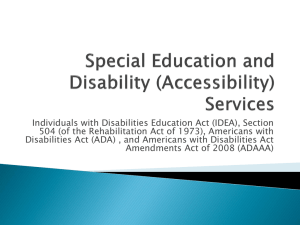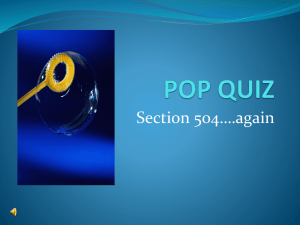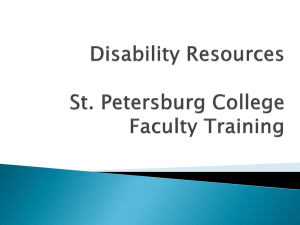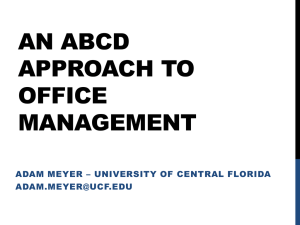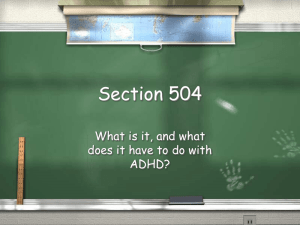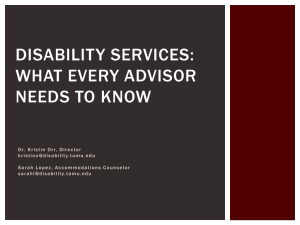A Faculty Guide - Santa Ana College
advertisement
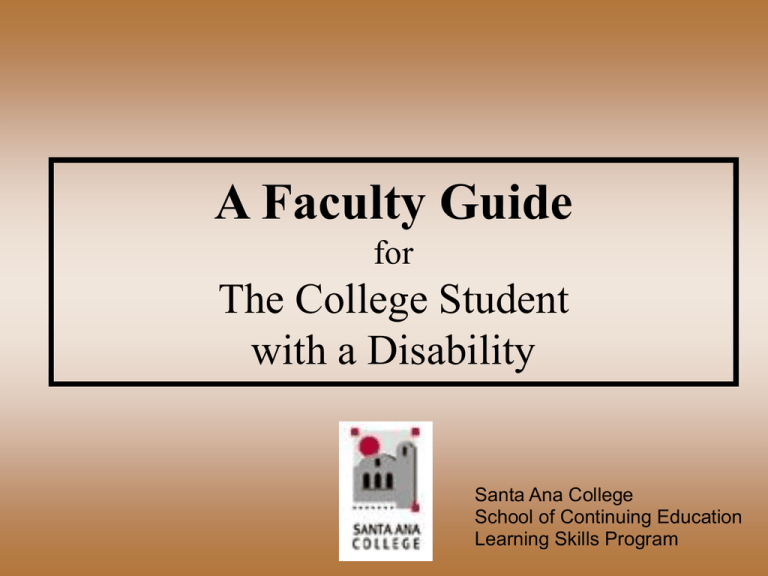
A Faculty Guide for The College Student with a Disability Santa Ana College School of Continuing Education Learning Skills Program Mission Statement The Learning Skills Program (LSP) at SAC’s School of Continuing Education is committed to providing equal access and eliminating barriers to educational opportunities for students with verifiable disabilities by providing specialized instructional programs, technology, and disability related services. The LSP encourages and fosters independence while assisting students in attaining their educational and vocational goals. Please Contact The LSP Office If You Have Any Questions Or Concerns LSP Office (714) 241-5768 / 5769 Fax (714) 434-7920 Disability And The Law The Americans with Disabilities Act and Section 504 of the Rehabilitation Act of 1973 are the two primary pieces of federal legislation which mandate that reasonable accommodations be provided to qualified students with disabilities. Other applicable laws include Section 508 of the Rehabilitation Act, the Americans with Disabilities Act, Title 5, and Assembly Bill 422. What Is A Learning Disability? According to the Title V regulations which govern the California community colleges, the definition of a learning disability is as follows: ~A learning disability in California community college adults is a persistent condition of presumed neurological dysfunction which may also exist with other disabling conditions. This dysfunction continues despite instruction in standard classroom situations. Learning Disabilities Are Manifested By Significant Difficulties In The Acquisition Of: •Written Language Skills •Oral Language Skills •Reading Skills •Social Skills •Mathematical Skills •Auditory Processing Skills •Organizational and Study Skills What Is The Learning Skills Program? This program is designed for students with documented learning disabilities who want to improve their basic skills for personal development, higher college placement scores, greater employability, or high school diploma completion. Courses offered are flexible, open entry/open exit and tuition free: • Skills for Success: Learn to set goals, get organized, study better, and succeed in life. • Learning Skills and Strategies: Improve basic reading, writing, and math skills. Learn to accomplish educational and career goals. LSP Program Courses Continued: • High School Diploma Courses: Specialized small group instruction, tutoring, accommodations and support services are provided to complete the High School Diploma Program. (Recommended 6.0 reading comprehension) LSP Program Courses Continued: • Educational Assessment: Learning Disability Awareness is provided to determine eligibility for community college services as required. Other Disabilities Students with other disabilities may also demonstrate difficulties in the classroom. Individuals with physical disabilities may have unique needs that can be met with special accommodations from the DSPS Program to promote academic success. Our goal is to enable and empower disabled students. Who is responsible for determining appropriate accommodations? The Learning Skills Program (LSP) and LD Specialists have the obligation and professional expertise to determine appropriate accommodations, and they are designated by the district to do so. Assessments are based on documentation collected from the student and the student’s functional limitations. Typical Accommodations May Include: • • • • • • • Test taking services and accommodations Tutoring Adaptive Computer Technology Alternative Text Formats Note-taking Registration Assistance Priority Registration How do students receive services? • Student makes contact with LSP or is referred by faculty to request accommodations. • Student is responsible for providing professional documentation of a qualified disability to LSP. • If student does not have appropriate verification of a Learning Disability, LSP will schedule a consultation for assessment to determine and document a learning disability. Student Accommodation Procedure Cont’d • The LD Specialist, in consultation with the student, will identify educational limitations and determine appropriate accommodations. • The recommended accommodations will be documented by LSP and a copy will be provided to the student. • Student provides instructor with an accommodation letter. • LSP assists instructor in providing accommodations. • Student and LSP evaluate accommodations which may include input from the instructor. Keep in Mind Faculty do not have the right to refuse to provide accommodations, to question whether the disability exists when the accommodations have been authorized by LSP, or to request to examine the student’s documentation. Student’s Right to Confidentiality Confidentiality of disability and accommodation related information is essential. All disability information a student chooses to share with an instructor should be used only for arranging accommodations. Instructors and staff must maintain a policy of strict confidentiality about the identity of the student with a disability, the nature of the disability, and the disabilityrelated accommodations s/he requires. To maintain confidentiality LSP staff cannot divulge if the student is already receiving LSP services. Student Confidentiality Cont’d An instructor must not disclose or discuss information about a student’s disability or accommodations with other persons, unless the student has authorized the disclosure by signing a release. It is not legal, for example to announce by name that a student needs a notetaker or to discuss the student’s disability in class or in the presence of other students. Frequently Asked Questions Are all student with disabilities registered with LSP or DSPS? No, it is likely that some students with disabilities have chosen not to be registered, or they may not have completed the documentation and intake process to establish eligibility. Do I have the right to know the nature of a student’s disability? The information regarding a student’s disability should be shared only when there is a compelling reason for disclosure. Do I have the right to give a student needing testing accommodations another form of the class exam? Yes. If the exam is not scheduled in the same time frame as the class exam, then you can reformat the exam to protect the integrity of the exam. However, the reformatted test would still need to cover the same information as the class exam. I have a policy of giving no makeup exams. Must I allow a student with a disability to makeup an exam missed due to their disability? Yes. If a student misses an exam for disability related reasons, they are legally entitled to a makeup exam. What about ESL students? They often request additional time to complete an in-class exam due to their unfamiliarity with the English language. You are not required to provide extended time for in-class exams to ESL students unless they have a documented disability which requires it. Are faculty expected to accommodate disruptive behavior? All students, disabled or not, are expected to follow the Student Code of Conduct. It is best to follow the standard college procedure if a student is disruptive. Sometimes it is automatically assumed that students with behavioral issues have a disability. LSP often receives calls asking that we intervene. A Final Note Sometimes students are not comfortable about approaching their instructor to ask for accommodations. Faculty can help ease the students concerns by incorporating the following statement into the syllabus: “A student with a disability, who would like to request an academic accommodation, is responsible for identifying herself/himself to the instructor and to the Disabled Student Programs and Services (DSPS). To make arrangements for academic accommodations, contact the DSPS Office for the School of Continuing Education at Centennial Education Center in D-101, or call (714) 241 – 5768.” SAC School of Continuing Education Learning Skills Program Learning Disability Specialist, Professor: Learning Disability Specialist, Instructor: Program Specialist: Mary Stephens Kristina De La Cerda Linda Morrow Please Contact The LSP Office If You Have Any Questions Or Concerns LSP Office (714) 241-5768 / 5769 Fax (714) 434-7920
